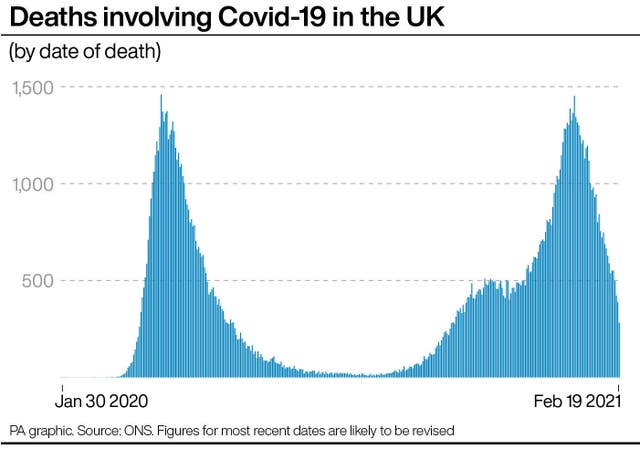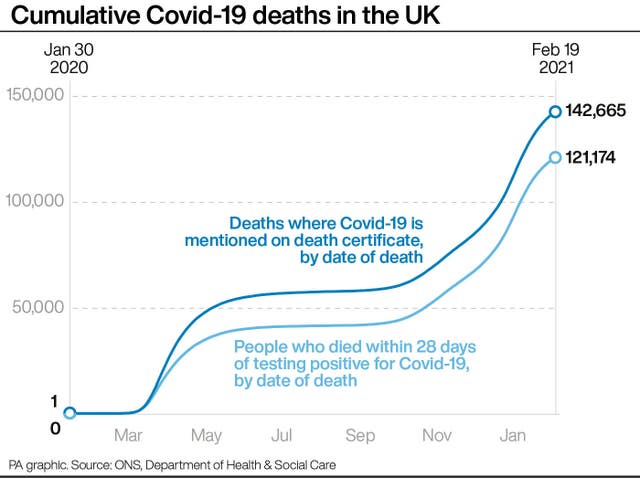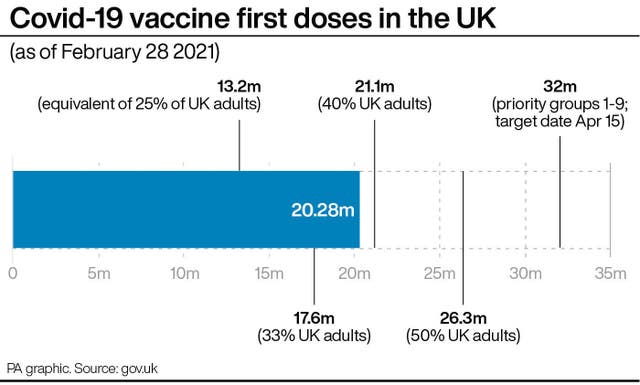
A study has found that the Manaus variant of coronavirus detected in the UK could cause reinfection for between 25% and 61% of people who have previously had Covid.
Research on the P1 variant among people living in the Brazilian city of Manaus found potentially high levels of reinfection, and that the variant was more transmissible than the original pandemic strain.
British experts have cautioned that the study cannot be used to predict what may happen in the UK, and say it does not suggest that vaccines will not work against the variant.
 (PA Graphics)
(PA Graphics)
To date, six cases of the Manaus variant have been found in England and Scotland, with experts still hunting for one of the six who tested positive.
According to the new study, from organisations including Imperial College London, Oxford University and the University of Sao Paulo, blood studies suggest more than 67% of people in Manaus may have had Covid by October 2020.
There was surprise then when the city suffered another huge wave of coronavirus at the start of this year, so experts sought to find out why.
They found that the proportion of Covid cases that were the P1 variant grew from zero to 87% in about eight weeks.
P1 was found to be 1.4 to 2.2 times more transmissible than other variants in Manaus, and was found to evade 25% to 61% of protective immunity from previous infection.
Dr Nuno Faria, reader in viral evolution at Imperial, told a briefing: “If 100 people were infected in Manaus last year, somewhere between 25 and 61 of them are susceptible to reinfection with P1.”
He said more work was needed on patterns that might occur in other countries, adding: “We know that vaccines are effective and they can protect us from infection and from disease and death.
“This is a period to be optimistic about the future. The more we know about the virus, the better we’re able to protect against it and I think there’s no concluding evidence to suggest at this point that the current vaccines won’t work against P1.”
Sharon Peacock, executive director and chairwoman of the Covid-19 Genomics UK (COG-UK) consortium, and professor of public health and microbiology at the University of Cambridge, said P1 had been found in 25 countries to date.
But she said the current study could not be used to speculate on the effectiveness of vaccines or how things will “pan out in other countries including the UK”.
 (PA Graphics)
(PA Graphics)
 (PA Graphics)
(PA Graphics)
How the findings, which have yet to be peer-reviewed, “relate to United Kingdom is yet to be determined”, she added.
The current dominant strain in the UK is the Kent variant and “we should be optimistic and pushing on with vaccination so that we can get a high level of immunity in our population, starting with the most vulnerable,” she said.
“The numbers of cases (of the Manaus variant) in the UK are very low at the moment.
“At the present time I don’t believe there’s any threat to our vaccination strategy, or likely effectiveness.
“I think what it reflects is the fact that… what these variants will mean is that the vaccine manufacturers will be looking to make adaptations to the vaccine so that people can have boosters and some of those adapted vaccines are already being tested in clinical studies.
“So, I think it’s a note of optimism, but also a note that we need to go forward and work with vaccine developers to ensure that over time we have vaccines that are effective for our population.”
 (PA Graphics)
(PA Graphics)
Experts do not so far believe that the P1 variant is more transmissible than the Kent variant, which in itself is more transmissible than the original pandemic strain.
Researchers at the briefing agreed that the current six cases of P1 in the UK was a low number, and it was thought multiple introductions of the variant would be needed for it to take off.
Dr Thomas Mellan, from Imperial, said researchers have found a somewhat increased risk of death with P1 in Manaus, but this was in a city with “substantial healthcare failure” such as a lack of oxygen.
It comes as one of the scientists behind the Oxford/AstraZeneca vaccine described real-world data on the effectiveness of the jabs as “stunning”.
Professor Andrew Pollard, director of the Oxford Vaccine Group, welcomed the study from Public Health England (PHE) which found that protection against developing symptomatic Covid-19 in the over-70s was around 60% for both Oxford and Pfizer after a single dose, while among the over-80s the vaccines offered more than 80% protection against hospital admission.
Prof Pollard told BBC Radio 4’s Today programme the findings were “stunning”, and this was for two reasons.
“First of all, because these data come from the hardest group to protect – those who are the frailest, the oldest adults in our population – and we’re seeing an 80% reduction in hospitalisation in that group, which is stunning,” he said.
“Second… both of the vaccines performed exactly the same, there was no daylight between them.
“We’ve had all this difficulty with communication, particularly around Europe, with uncertainty about the evidence, whereas in the UK we’ve been rolling out both vaccines in the confidence that they would both give high levels of protection.
“And that’s absolutely what we’ve seen now in this real-world evidence – that whether you’ve had a Pfizer vaccine or the Oxford AstraZeneca vaccine, you have very high levels of protection.”
 (PA Graphics)
(PA Graphics)
Prof Pollard said around 5,000 people are dying every day from Covid across Europe, where some leaders have shunned the Oxford vaccine for older age groups.
Prof Pollard said: “It just shows how critical it is to improve public confidence across the continent about the vaccines, and that’s why the data that appears today is so important – to show that both of the vaccines which are widely available in Europe can have this big impact.”
Asked about France reversing its decision not to recommend the Oxford jab for over-65s, Prof Pollard said he thought many countries would now be looking at the latest data.
Prof Pollard said trials of the Oxford vaccine have already started on younger age groups down to 12 years of age, with trials on younger groups starting soon, and results expected towards early summer.
Data on pregnant women had found “no concerns there so far”, he added, saying that new trials on pregnant women were planned.



Why are you making commenting on The Herald only available to subscribers?
It should have been a safe space for informed debate, somewhere for readers to discuss issues around the biggest stories of the day, but all too often the below the line comments on most websites have become bogged down by off-topic discussions and abuse.
heraldscotland.com is tackling this problem by allowing only subscribers to comment.
We are doing this to improve the experience for our loyal readers and we believe it will reduce the ability of trolls and troublemakers, who occasionally find their way onto our site, to abuse our journalists and readers. We also hope it will help the comments section fulfil its promise as a part of Scotland's conversation with itself.
We are lucky at The Herald. We are read by an informed, educated readership who can add their knowledge and insights to our stories.
That is invaluable.
We are making the subscriber-only change to support our valued readers, who tell us they don't want the site cluttered up with irrelevant comments, untruths and abuse.
In the past, the journalist’s job was to collect and distribute information to the audience. Technology means that readers can shape a discussion. We look forward to hearing from you on heraldscotland.com
Comments & Moderation
Readers’ comments: You are personally liable for the content of any comments you upload to this website, so please act responsibly. We do not pre-moderate or monitor readers’ comments appearing on our websites, but we do post-moderate in response to complaints we receive or otherwise when a potential problem comes to our attention. You can make a complaint by using the ‘report this post’ link . We may then apply our discretion under the user terms to amend or delete comments.
Post moderation is undertaken full-time 9am-6pm on weekdays, and on a part-time basis outwith those hours.
Read the rules here